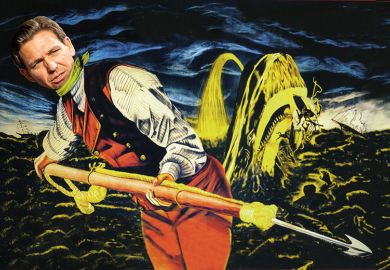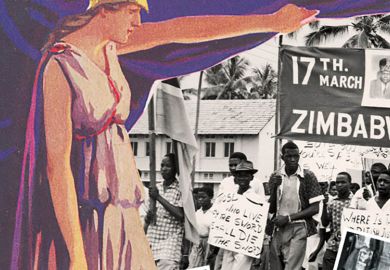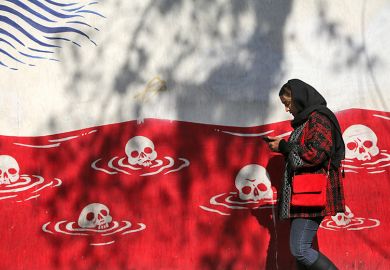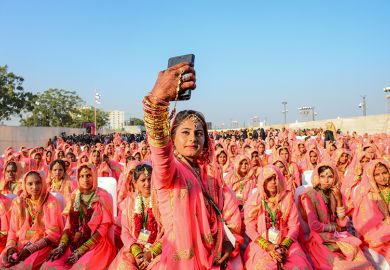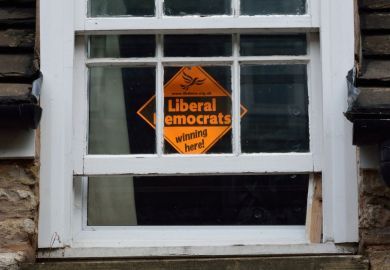A months-long protest on behalf of a suspended professor at the top-ranked US public university has centred on details of alleged sexual harassment and stalking, but carries a more expansive subtext: minority rights and the decline in teaching about colonialism.
The drama features Ivonne del Valle, an associate professor of colonial studies at the University of California, Berkeley, and Joshua Clover, a professor of English and comparative literature at the University of California, Davis.
Dr del Valle has been subjected to extended suspensions by Berkeley in a case dating back to 2018, after the two attended a campus event and then met at a later date at a bar, where Professor Clover described facing what he regarded as an attempt to create a personal relationship.
That meeting led to events that include allegations of stalking directed at Dr del Valle; her losing a job offer from the University of Michigan-Ann Arbor after Berkeley disclosed its investigations of her; and, in recent weeks, a series of protests on her behalf involving student arrests and interruptions to a university football game and a major UC Berkeley Symphony Orchestra performance.
The protest leaders have insisted – despite evidence suggesting the opposite – that Dr del Valle has been the victim of stalking by Professor Clover. But more clearly, in their calls for her reinstatement, the students have emphasised the importance of her scholarship and her value as a teacher.
“We’re mostly Latinx student groups collaborating to show solidarity to one of the few tenure[d] Latinas on campus,” the students said in outlining their demand. “We cannot remain silent when the university has purposely strategised to push one of our own out of academia.”
Professor Clover has accused Dr del Valle of engaging in an escalating campaign of harassment after he made clear he didn’t welcome the implications he felt at the bar meeting, including her leaving repeated voicemails and writing an abusive message in chalk in front of the home of his mother, a former Berkeley professor and friend of the current campus chancellor, Carol Christ.
Dr del Valle has acknowledged such behaviour and expressed regret for it, but said the university had not taken seriously her belief that Professor Clover – a specialist in Marxist political theory – had somehow gained access to her computer and even her phone’s camera, an allegation the professor is understood to deny.
The student protesters have pressed their case through written testimonials from several dozen students and colleagues of Dr del Valle who endorse her contention that she has been mistreated in the investigative process. But more fundamentally, their letters are pleas for the university to understand the value of her teaching and research into the colonial period in Mexico.
“Not only is Dr del Valle irreplaceable as a first-gen Mexican scholar, because there are truly so few, but she is a pillar in a field that is also irreplaceable in a world that is facing violence, climate catastrophe, and migrations that are rooted in colonial projects,” said Alejandra Decker, a doctoral candidate in Hispanic languages and literatures who was advised by Dr del Valle.
A devoted commitment by students to preserve colonial studies should not be surprising, said one expert in the field, Jennifer Gray, an assistant professor of English at Tennessee Tech University. Dr Gray said she had no familiarity with the details of the controversy at Berkeley, but recognised that the field of colonial studies was among many in the humanities struggling to hold its ground, despite clear student appreciation for its importance.
Dr Gray said she taught British literature, but took care to emphasise the historical context. “And year after year, students say, ‘Oh my gosh – I didn’t know anything about this, I can’t believe it.’”
Even if they were not majoring in colonial studies, Dr Gray said, students realised that many of the things they were taught were leaving out key explanations of why political realities developed the way they did.
“They want to know why,” she said, “and we need to step up and help them navigate that world.”
Register to continue
Why register?
- Registration is free and only takes a moment
- Once registered, you can read 3 articles a month
- Sign up for our newsletter
Subscribe
Or subscribe for unlimited access to:
- Unlimited access to news, views, insights & reviews
- Digital editions
- Digital access to THE’s university and college rankings analysis
Already registered or a current subscriber?

